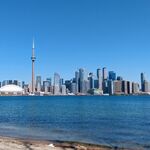Nobody said we have to be the world's morality police. But what is wrong with having a more principled foreign policy. 2 decades ago that idea was supported by every political party in Canada. Indeed, Brian Mulroney made significant efforts to fight apartheid in South Africa. Today, we have Liberals who cry about human rights at home and then complain about not trading enough with China. And we have Conservatives who pick and choose which countries they want to have relationships with and then justify that countries HR record.
I am all for bringing back principles. None of it means that we have to slap on embargoes everywhere. But we should do what we as a small country can. It just like fighting climate change. You make a difference with what you got. Canada being more selective with the kind of trade we do with China would send a message that we care about human rights. Or maybe we can help dissidents in Cuba or gays in Jamaica by helping them advocate for change or at least speaking up when they get carted off to prison. I interact with diplomats regularly. I know how little of this they do. Not because they don't care. Many of them are quite passionate about this stuff. It's because our governments (both Liberal and Conservative) couldn't care less about putting in effort on these problems. The excuse is always the same. 'What can we do? We're a small country.' ' We don't want to be the world's police.' ' There's no room for morality in foreign affairs.' I'd like to think Canadians are better than that.
If we had this kind of an attitude during WWII, we wouldn't have taken any Jewish refugees in or work to free them....after all who are we to speak up about their rights?
I think Canada moreso than any other developed nation has been at the forefront of global peacekeeping and the pursuit of universal human rights. My point is that we (especially at the individual level) can only or rather
should only do so much. Canadian society isn't at all perfect itself, and the time we're spending preoccupied with the world's suffering our own unemployment and poverty rates continue to escalate, nationwide infrastructure is badly in need of repair and renewal, taxation is imbalanced with the average Canadian seeing less returns, political stability is volatile at best and at no particular time can citizens ever feel certain and secure nowadays with which party will be leading us six months down the road.
Cuba's internal problems for all we know are nowhere as bad as "
some poor sap getting tortured down the street as tourists frollick", which is what first alarmed me into speaking up here. The lack of cross-communication of media into their society though may present a false impression. Like most Caribbean nations the majority of the Cuban population is impoverished yes, bolstered on by the trade embargo which may result in older vehicles being the norm for transportation. However from the time I spent there, living with a local family in Havana for about a month some years back, I saw no visible signs of oppression. The people were smiling, jovial, often street-performing, everyone hustling to make a few pesos or luckily some USD. There was highway intrastructure in the capital resembling that of the Gardiner in downtown Toronto. There were high-rise buildings, aquariums and zoos. Their hospitals were very modernist as well and their doctors are world renown. Honestly it was as if I was in Europe, the way some parts looked with older Gothic artitecture and some cobbled streets in Old Habana, then a few kms over a totally different experience. When the time came up for me to leave, I seriously wanted to stay another week. And mind you, I wasn't staying in some fancy hotel resort on some far-removed pictureque beach. No, I had the
real Cuban experience hanging out where the locals do and the lady we stayed with, an accredited pharmaceutist whose never left the island, only had nice things to say about the way-of-life there. As did her elderly parents, obviously around when the regime began in 1959.
In light of all this, I personally feel that America's approach to dealing with Cuba is all wrong. As a Political Science major I can tell you that isolating the regime from the greater community is the surest way for Cuban people to come to accept Communism as an absolute not worth publically dissenting against because they haven't been exposed to anything else. Hence severing the linkages that facilitate leverage. Instead, finding commonality with Cuba: opening up trade barriers; encouraging the free flow of immigration, tourism, expatriation of skilled workers, social networking; give Castro incentives to democratize (Carrot/Stick approach) either economic and security perks like investment, credit, treaties and/or memebership into NATO
or the more highly controversial route of threatening trade, aid and security sanctions-- these are all proactive ways in which Canada can assist in the democratic transition of Cuba.




